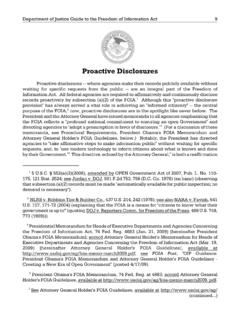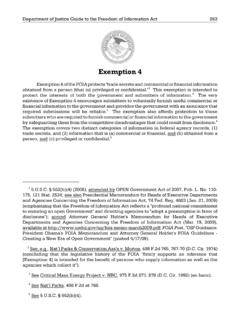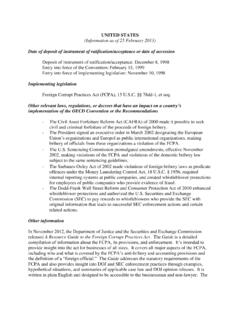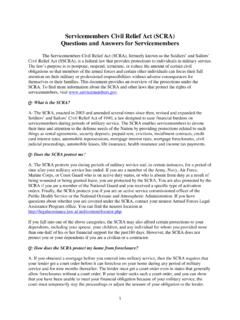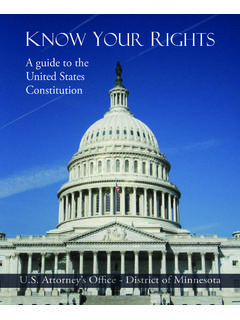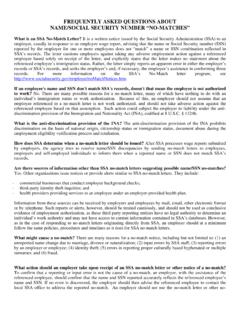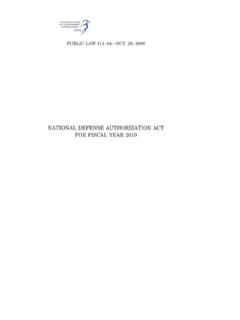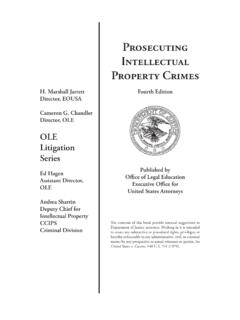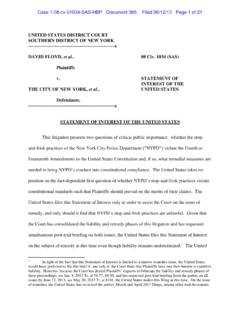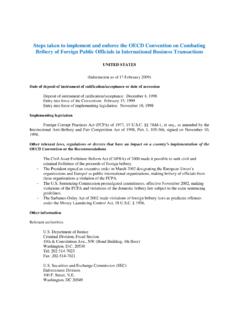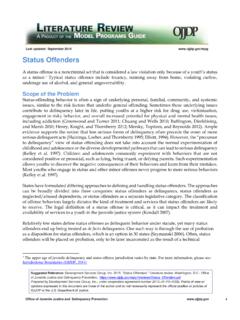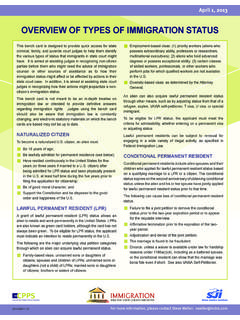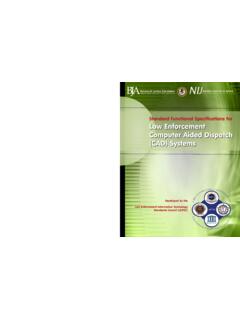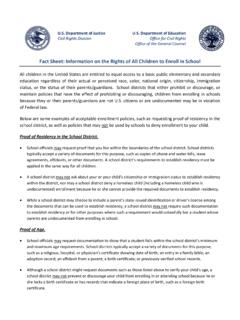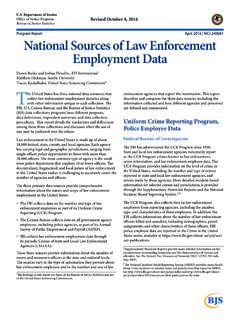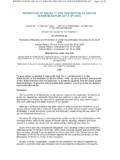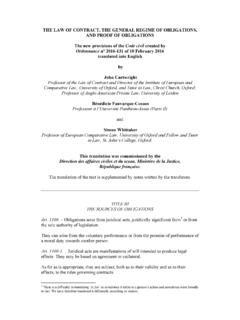Transcription of FUNDAMENTALS OF IMMIGRATION LAW - Justice
1 FUNDAMENTALS OF IMMIGRATION LAWbyCharles A. Wiegand, IIII mmigration Judge, Oakdale, Louisiana Revised October 2011 Philip Verrillo, IMMIGRATION Judge, Hartford, ConnecticutSarah Byrd, Attorney Advisor, Falls Church, VirginiaAlexa McDonnell, Attorney Advisor, Philadelphia, PennsylvaniaSarah Rempel, Attorney Advisor, Hartford, Connecticut- i -TABLE OF entry doctrine .. for or and permanent and credible fear of application for Fear of other of aliens inadmissible on security and related and custody under of criminal of aliens certified as terrorists - Section 236A of the migrations and national security subject to expedited other, non-criminal, non-terrorist, in bond for additional or subsequent bond of bond of inadmissibility in removal grounds - Section 212(a)(1).
2 Involving moral turpitude ( CIMT ).. substance criminal in controlled & importers of who asserted immunity from prosecution - Section 212(a)(2)(E).. or unlawful of the Government of the effects on foreign ii or totalitarian party or Acts of Torture or Extrajudicial labor medical foreign health-care entrants and IMMIGRATION in possession of valid, unexpired in possession of valid entry documents, such as who are permanently ineligible for citizenship - Section212(a)(8)(A).. previously removed or unlawfully required to accompany helpless child citizens who renounced citizenship to avoid of deportability in removal at time of entry or adjustment of in violation of nonimmigrant of conditions of of conditional permanent w/in 5 years of of an aggravated of high speed to register as a sex substance conviction.
3 Abusers and of domestic violence, stalking, and child of protection to claiming security and related foreign policy in Nazi persecution or engaged in iii of certain nonimmigrants prohibited without under section 237(c) for special in removal to the of the of the NTA, motions to dismiss and remand, and termination bythe in removal to appear - in absentia of removal not involving an from and Security Investigations in Proceedings Before an departure - Section of application for of removal for certain permanent residents under section 240A(a)and for certain nonpermanent residents under section 240A(b).. waiver under former section 212(c).. of removal - Section 241(b)(3).. law common to both asylum and withholding of Convention Against of status - Section 245 of the Act and 8 , et Adjustment and Central American Relief Act (NACARA).
4 To removability available to aliens convicted of charge requires a conviction and the conviction does not support Recommendations Against Deportation ( JRADS ).. of proof and iv from an application to adjust an alien s status to that of a lawfultemporary resident under section 210 of the exclusionary rule in IMMIGRATION proceedings and motions to doctrine of equitable doctrine of collateral estoppel or res which are not IJ s duties regarding , rape, or sexual abuse of a trafficking in any controlled trafficking in firearms or destructive devices .. of monetary materials and firearms crime of , burglary, and receipt of stolen for or receipt of or , slavery, or involuntary servitude .. or transmitting national defense offense that involves fraud or deceit in which the loss to the victim orvictims exceeds $10,000 or an offense related to tax evasion.
5 Making, forging, counterfeiting, mutilating, or altering a passport to appear for service of bribery, counterfeiting, forgery, or trafficking in of Justice , perjury, or bribery of a to appear before a court pursuant to a court order to answer to ordispose of a charge of a felony .. attempt or conspiracy to commit any such act described by date of conviction, moral character ( GMC ) - Section 101(f) of the of Good Moral lacking good moral character as listed in section 101(f).. provision of section 101(f)..331- v protected status (TPS) - Section grant of TPS waives certain grounds of inadmissibility or deportability .. by the Attorney period of to consider eligible for TPS .. of TPS - Section 244(c)(3) of the and cancellation of removal under section 240A(a).. and status during TPS - Section 244(f) of the that have been designated for TPS.
6 To reopen, reconsider, and remand under the to to to reopen in to reopen to apply for asylum or withholding of to reopen to rescind a removal order rendered in to reopen orders that were entered in absentia in to reopen orders that were entered in absentia in motion to reopen or reconsider based upon a claim of ineffective assistanceof to reopen in order to apply for adjustment of to reopen to apply for cancellation of removal under section 240A ofthe to file the sponte reopening or to the Board from decisions made by an of right to the limits for appealing parties .. for by of of review on from in absentia orders of of from Board for background and security 1 of entry doctrine the enactment of the Illegal IMMIGRATION Reform and ImmigrantResponsibility Act of 1996 ( IIRIRA ), the decision as to whether an alienwas subject to deportation proceedings or exclusion proceedings was based onwhether or not the alien had made an entry into the An alien who hadmade an entry was entitled to a deportation hearing and the greater proceduralsafeguards it provided.
7 An alien who had not made an entry was placed inexclusion proceedings. Former section 101(a)(13) of the Act defined entry as any coming of an alien into the from a foreign port or place. TheBoard of IMMIGRATION Appeals ( Board ) formulated a more precise definitionof entry so as to better distinguish between exclusion and deportation in Matter of Pierre, 14 I&N Dec. 467 (BIA 1973), Matter of Phelisna, 18 I&NDec. 272 (BIA 1982), and Matter of G-, 20 I&N Dec. 764 (BIA 1993). All ofthis came to be known as the entry doctrine. exception also arose for lawful permanent residents ( LPR s) returning tothe after a brief, casual, and innocent departure. The Supreme Court heldthat such a departure would not constitute an entry within the meaning offormer section 101(a)(13). Rosenberg v. Fleuti, 374 449 (1963).
8 Thisbecame known as the Fleuti Doctrine. two doctrines caused a great deal of litigation over the issue of whethercertain aliens were properly placed in exclusion proceedings. They wererather time consuming and, since they dealt with the issue of whether or notthe alien was in the proper proceeding, delayed the addressing of the ultimateissues in the cases, the issues of excludability and eligibility for the IIRIRA, Congress sought to simplify things by creating removalproceedings which are applicable to aliens admitted to the United States,aliens applying for admission, and aliens present in the United States withoutbeing inspected and admitted. It also made the difference dependent simplyon whether the alien had been admitted or for 235(a)(1) of the Act provides that An alien present in the UnitedStates who has not been admitted or who arrives in the United States (whetheror not at a designated port of arrival and including an alien who is brought tothe United States after having been interdicted in international or UnitedStates waters) shall be deemed for purposes of this Act an applicant foradmission.
9 Page 2 of term arriving alien means an alien who seeks admission to or transitthrough the United States, as provided in 8 , at a port of entry,or an alien who is interdicted in international or United States waters andbrought into the United States by any means, whether or not to a designatedport-of-entry, and regardless of the means of transport. 8 (q). arriving alien remains such even if paroled pursuant to section 212(d)(5) ofthe Act. 8 (q). alien who leaves the to seek refugee status in Canada, and thenreturns to the after the application was denied in Canada, is deemed to beseeking admission to the Therefore, such an alien is deemed to be anarriving alien. Matter of R-D-, 24 I&N Dec. 221 (BIA 2007). or 101(a)(13)(A) of the Act, as amended by section 301 of the IIRIRA,provides that the terms admission and admitted mean the lawful entry ofan alien into the after inspection and authorization by an alien who has not been admitted to the United States is subject to theinadmissibility grounds under section 212(a) of the Act, 8 1182(a).
10 Pursuant to 237(a) of the Act, 8 1227(a), an alien (including an aliencrew member) in and admitted to the United States is subject to thedeportation grounds under that section. Under section 237(a)(1)(A) of theAct, deportable aliens includes any alien who was inadmissible at the time ofentry or adjustment of Board held that an alien who initially entered the without inspection,but whose conviction for an aggravated felony was subsequent to heradjustment of status to that of a lawful permanent resident under section 245 Aof the Act, is deportable under section 237(a)(2)(A)(iii) of the Act as an alienwho was convicted of an aggravated felony after admission. Matter ofRosas, 22 I&N Dec. 616 (BIA 1999). and alien who is paroled under section 212(d)(5) of the Act or permitted toland temporarily as a crewman shall not be considered to have been admitted.
